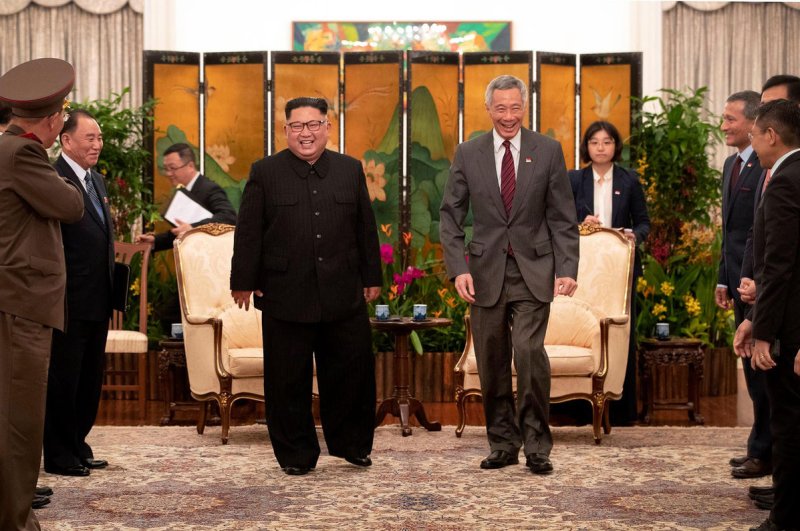Prime Minister Lee Hsien Loong (R) of Singapore meets with North Korean leader Kim Jong Un in June. Despite Singapore’s all-out $15 million effort to host U.S. President Donald Trump and Kim for their first summit, the city-state is on the more "cautious end of the spectrum" when it comes to a new South Korean policy. File Photo by Terence Tan/Ministry of Communications and Information, Singapore |
License Photo
NEW YORK, Dec. 20 (UPI) -- South Korean President Moon Jae-in's foreign policy provides incentives for member states of the Association of Southeast Asian Nations to facilitate engagement with North Korea -- but some countries are cautious about getting too involved, an analyst told UPI.
Hoo Chiew-Ping of the National University of Malaysia, who disclosed in November that North Korea reached out to a think tank in Myanmar, said Moon's New Southern Policy, with its three pillars of "people, prosperity and peace," includes hopes for ASEAN involvement in inter-Korea engagement.
"On the peace part, he kind of expects these ASEAN countries to play up their special role," Hoo said in a phone interview. "Moon Jae-in actually did express the hope that ASEAN countries can provide another kind of platform, for dialogue, between the two Koreas."
The South Korean president's objective of North Korea engagement through ASEAN is a new feature in Seoul's Southeast Asia policy, one that has evolved in 2018 with unprecedented diplomacy between Pyongyang and Seoul, and between Pyongyang and Washington. Singapore's hosting of the historic U.S.-North Korea summit drew world attention to that country's ability to bring the two adversaries together, and Vietnam has offered its model of economic reform to visiting North Korean Foreign Minister Ri Yong Ho.
But despite Singapore's all-out $15 million effort to host U.S. President Donald Trump and Kim Jong Un, the city-state, along with Brunei, are on the more "cautious end of the spectrum" when it comes to South Korea's new policy, Hoo said.
Southeast Asian countries may have to make their decisions soon about their degree of involvement in the inter-Korea peace process.
Seksan Anantasirikiat, editor of the Seoul National University Journal of International Affairs and coordinator of the ASEAN Roundtable at his school, told UPI Moon's New Southern Policy is a sign of rapidly upgrading ties between Seoul and countries like Thailand and Indonesia.
"South Korea's relations with ASEAN in the next decades will be more people-oriented. This is the key word of ASEAN in its vision toward 2025," Anantasirikiat said, adding Southeast Asia welcomes the new policy from Seoul.
"South Korea has no ambition to establish regional hegemony. ASEAN countries have positive perception of South Korea as a developing country that has been successful in economic development, and South Korea has no major territorial and historical disputes with ASEAN," Anantasirikiat said.
South Korea may also see the strategic partnerships ASEAN member states could provide, much like the United States and China.
Devin Stewart, a senior fellow and director at the Carnegie Council in New York, told UPI ASEAN is very much on the Trump administration's radar.
"Trump values U.S. relationships in East Asia and ASEAN at least as equally as Obama," Stewart said. "While some critics worried about the symbolism of Trump skipping the recent ASEAN summit in Singapore, Vice President Mike Pence has been widely praised as being a competent and stalwart administration representative and friend of ASEAN."
China has also wooed countries with promises of assistance for economic development, setting the stage for a difficult scenario, when states could be forced to choose sides in a "looming Sino-U.S. cold war."
"ASEAN countries can try to leverage their relationships with the United States and China by playing them off one another, as Duterte's Philippines has done by downgrading his country's military relations with the United States as a concession to China over disputes on human rights," said Stewart, who recently co-authored a white paper on Asia's geopolitics.
Washington needs ASEAN's assistance in the enforcement of North Korea sanctions, but a history of ties with Pyongyang for several of the countries may have them feeling that they are being forced to choose sides.
"Due to the long-running trade ties between Singapore and North Korea, we will see from time to time some companies have not abided by the sanctions," Hoo said, referring to the recent lawsuit from the U.S. Department of Justice against Singapore-based companies, including the Cooperating Co. and Apex Choice Ltd., for laundering U.S. dollars on behalf of sanctioned North Korea banks.
ASEAN's ties to North Korea, with the possible exception of Brunei and the Philippines, have also remained remarkably friendly, despite recent incidents like the assassination of Kim Jong Nam in Malaysia.
The assassination "deteriorated bilateral relations between North Korea and Malaysia, but it did not convert to any strategic shift toward South Korea" for the Malaysian government, Anantasirikiat said.
Anantasirikiat, a native of Thailand, said Southeast Asia ought to become more involved in the inter-Korea peace process.
"What ASEAN could do is to maintain its centrality in promoting South-North engagement via what I call the 'ASEAN+2 Security Community Initiative'," he said.
"ASEAN countries should invite North Korean diplomats and policymakers to learn about our path on political and economic development without nuclear weapons."















